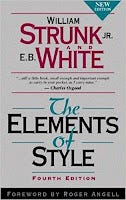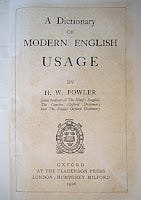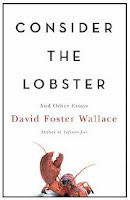Welcome to the Fictional Aether, where we take regular comfort from things that aren’t real, and very occasionally from things that are. I will not be publishing any new material for a while, due to the intrusion of what some laughingly refer to as “real life”. This week I’ve re-published an old piece from 2021. I am wracked with guilt for failing to provide something new, but, on the other hand: I re-read it and it made me happy. Maybe it’ll make you happy, too. Also — no, let’s just get on with it. I’ll put a post-script of further rumination at the end.
Here follows the story of my adventures with an obscure rule of English usage. Brace yourself.
The story begins in my first year of graduate school at the University of North Carolina at Chapel Hill. One of the emeritus faculty was Eugen Merzbacher. Many years previously he wrote what became a standard quantum mechanics textbook. It was so ubiquitous that when one of my fellow PhD students visited the university before accepting their offer of a place in the graduate program, he was utterly starstruck to discover that he would be hosted at Merzbacher's house. He breathlessly recalled his time in the home of the maestro. "I couldn't believe it! In the morning Merzbacher cooked me eggs!"
Merzbacher no longer taught, but I later met a more senior student who had taken one of his last quantum mechanics classes. "He was really getting old. At the beginning of the lecture he'd get confused over the simplest stuff. He'd fumble over the uncertainty principle. But as the lecture went on, he warmed up, and by the end he was just on fire. It was incredible to watch. He was at the board, writing down Clebsch-Gordon coefficients from memory."
So I was excited when Merzbacher sent a department-wide email asking if any student was willing to help him proof-read a new edition of his textbook. He was even offering a nominal payment. I responded instantly.
I remember only three things about the experience.
The first was our initial meeting. I was determined to impress him with my devotion to our chosen profession. He would see that I, too, lived and breathed and dreamed science. He asked me how good my English was. I immediately blurted out, "Probably better than my physics." Shit! You couldn't hide a thing from this crafty old fox!
The third thing I remember is that I did a terrible job. There was very little time and I soon realised that a proof reader has as much affinity to a true reader as a lie detector does to a philosopher. I barely had time to identify that the spellchecker had missed a few wrung wards, and check the typesetting of equations by comparing with the previous edition. By the time I got to the last chapter, I would have passed right by "All work and no play makes Eugen a dull boy". When the book was published, my pride at seeing my name amongst the acknowledgements was transformed to shame when I spotted an early chapter that opened with a large, prominently displayed fundamental equation, without an "=" sign.
But let's go back to the second thing I remember, at our original meeting. After I had mixed up the discipline I should brag about, he confessed that he was still, even after multiple editions of his famous textbook, learning basic things about grammar.
"For example," he said, "Do you know the difference between `that' and `which'?"
I had learned to keep quiet.
"I just heard about this," he said. "If you take away the part of the sentence after `that' or `which', and it still makes sense, then you should use `which', with a comma. If it doesn't make sense by itself, you use `that', without a comma."
It was a perfectly clear lesson, and I have never forgotten it.
I don't know why. My subconscious has failed to absorb many standard grammar rules — no doubt all my friends make less mistakes than me — but this one is baked in.
Fortunately one rule is all you need to be a grammar snob, and I enjoyed many years of stern scolding and disappointed tut-tutting. It helped that I was surrounded by easy targets. Scientists are by and large an unruly mob of illiterates. At high school they didn't fall in love with science, they just fell in love with the classes with no essays. Their idea of an eloquent thinker was Yoda. These bumbling peasants had no idea that they were starting a career where success is entirely dependent on formal writing — or that my smug opprobrium would be waiting for them.
Some of them try to fight. They argue that the rules of grammar, let alone the niceties of recommended usage, are irrelevant. It is the truth that matters. Data, calculations, the rules of logic. Am I with the discoverers, the inventors, and the geniuses who have spent the last centuries pushing back ignorance and superstition, or am I with the politicians and lawyers and other liars?
Most of these repugnant yokels are sunk when no-one will publish their papers, but some make it through, without once opening a copy of Strunk and White. After all, Merzbacher made it to the end of his career without reading their sage advice on “that” and “which”: "It would be a convenience to all if these two pronouns were used with precision. The careful writer, watchful for small conveniences, goes which-hunting, removes the defining whiches, and so doing improves his work." You tell 'em, boys! If only E.B. White had not wasted all that time writing about mice and spiders, and instead taken a useful job as editor of the Physical Review!
Alas, it was not to be, and the field is littered with the unlettered. But they are easily punished. Feel free to steal all their ideas — there is no way they can prove precedence, because no-one can understand a word they write.
I lived my blissful life as a which-hunter for over a decade, and then I moved to the UK, and was sunk. Is that because the population are all fiendish wordsmiths? Ha ha! Don't be absurd. The English act as if they are even more ashamed of their language than of their cuisine. Their proud manta is: "We put this language together, and, by God, we're going to take it apart." No, the problem is that in UK English you are free to choose between "that" and "which" for your restrictive clauses. Noble souls have fought this — early editions of Fowler lamented that "better use might have been made of the material to hand" — but the struggle is almost lost. (I say "almost" only because I see that the feisty first edition of Fowler is back in print.)
Perhaps it is better that way. Like many a word prude before me, I have taken solace from David Foster Wallace's long 1998 disquisition on modern usage. And not just the Harpers cut, but the unabridged version in Consider the Lobster — twice the length, and twice the footnotes! His pyrotechnical prose can be irritating, but in this case, in such an enthusiastic celebration of language, it is fitting. If he had realised that ridiculously outsized footnotes are an amusing lark only once, this article would have been that one perfect place for them.
The excuse for his meditation was the publication of a new usage guide, A Dictionary of Modern American Usage, by Bryan Garner. It warmed my heart to later read about Garner's surprise when the article made him famous — try the introduction to his book of an interview with Wallace, published eight years after Wallace's death, or this podcast with Garner — and I slowly absorbed the lesson that both Wallace and Garner impart: the grammar grouch lives a frustrating life. Ignorance would be bliss.
So now I am old and wise and forgiving. Whenever I see a "which" that Strunk and White and Fowler and Garner and any good American editor would disapprove of, I have learned to smile and remember my little encounter with a wise old man from a previous age. And try not to remember that I almost ruined his book.
Postscript: Merzbacher didn’t seem to hold my poor proofreading skills against me. A few years later I house-sat for him over a summer, and he was extremely kind and gracious and welcoming, even in the aftermath of my having some friends over to watch a Kurosawa film. (Don’t let your imagination run wild over the damage we caused: a water glass left a stain on his coffee table.) I didn’t see him after that, and he died in 2013. As always, I realise too late that instead of exchanging occasional pleasantries when he was in the house, I should have pressed him for every story he could tell of his youth during the Second World War, and doing a PhD with Schwinger, and quantum physics in the 1950s, and meeting Bohr.
Currently my main occupation is editing several large scientific papers. Maybe I latched on to this particular piece to re-publish because it’s a reminder that, yes, writing good fiction is hard, and writing good essays is hard, but you know what? Clear, coherent, technical scientific exposition is damned hard, too.






Writing scientific papers back in the years of my life I spent as a research scientist made me a better overall writer - it taught me to be both concise and clear, which applies itself very nicely to fiction, too. But I prefer writing novels.
This was an essay which made me smile. (Okay, particularly egregious example, but it’s early over here.)